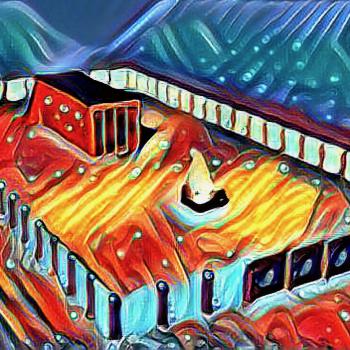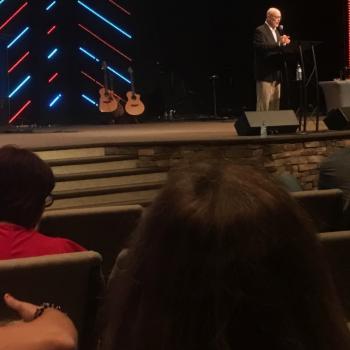John Cassian is from the East but he descends to the West. When all is said and done in his life, he is not perceived as a saint by the West, but he remains a saint in the East. Maybe it’s because he and Augustine aren’t exactly pen pals, but they are corresponding.[1]
In the previous writing, I shared some of what Cassian believes about Ephesians 4. The Primitive Church Fathers, Patristics, or Early Church Fathers are not exactly doing Theology Proper. They are often writing against heresies. We are grateful for their chatter that often exposes darkness, so that darkness can come out of the places or people where it has gained a foothold (Ephesians 5.8-15). Sometimes a bishop is encouraging another bishop.
We may even find them bantering back and forth like Cassian and Augustine. It’s also like a series in a peer-reviewed journal, where fellows discuss various opinions on the same thread. In both cases with the Patristics and modern day journals, we come away with a more well-rounded understanding of the topic at hand.
I’ll continue the trek through verse 28. Cassian is quite successful, to say the least, at establishing a network of monasteries in the general Persia area, after serving as one of John Chrysostom’s disciples. He is one of the first to establish and teach the West about the aesthetic life, although one could make a case for the biography that Athanasius writes about Antony. I would also add that if Jerome were not so busy translating the entire Bible, perhaps he too would have the time to teach us extensively about the aesthetic community he establishes near Bethlehem.

These are all leaders who impact us greatly with early spiritual formation literature, yet Cassian’s book The Institutes shines like a sunspear in the late summer sky, and that is like the Early Church.
Cassian on Ephesians 4.28
Let the thief no longer steal,
but rather let him labor, doing honest work with his own hands,
so that he may have something to share with anyone in need. (ESV)
Now Paul turns to Proverbial sayings, that are teachings. He makes it clear that we go through changes as Christians. We stop persistent sins. The changes affect our whole person, including our bodies.
Honestly, I really dislike pop-Theology that tries to read our culture back into the Bible as an interpretive guide. We want Scripture to speak to us now, but our culture sits down below Scripture, not the other way around. All that to say that the Hebrew Bible is rich with symbolism. Again, Paul seems to be writing in that style, so we can form an interpretation.
Hands usually represent a couple of things in Scripture, our work and our power/strength.
i. Perhaps a thief looks at thievery as his work
I don’t know. A thief may give his strength and intelligent cunning to his “work.” However, Paul says that the Christian who has left that lifestyle will find freedom in the discipline of an honest day’s work, and a good Puritan work ethic (I add Puritan to work ethic as a common point of reference, and I’m guessing that Paul would probably approve).
The 1st and the 3rd lines of verse 28 are in complete contrast, with the 3rd being the axiom. The 2nd line is the bridge to the new life, the spiritual practice of vocation and work.
ii. . . . and there’s your thief
There are many ways to catch a thief I’m sure. However, in my younger days of retail, any one of us workers could make a citizen’s arrest the moment a thief would step foot outside of the door with unbought merchandise.
On the other hand, there are ways to prevent thievery, and too many to count I’m sure. One of the things we were instructed to look for is if someone who comes into the establishment and tries to demand the attention of one of the workers. It could be an attractive member of the opposite gender who strikes up a forward conversation. It could be a customer service question that drones on and on from someone. Then we were told, keep looking around because there is usually another person you can’t pay attention to because you’re distracted . . . and there’s your thief.
So you have those who have ability to employ people who are also acting as public heroes, even if they’re not officers. Then you have those who could be employed or changed completely if they would allow a transformation to take place.
iii. This Scripture may not only apply to former thieves
Our 9-5 or anything that we do, from C.E.O. to housewife, should be affected by the changes within us. Paul is an example of disciplined work and vocation. When John Cassian considers Ephesians 4.28, he refers to Acts 18.1-3.[2] Paul partners with others to minister and to work in the marketplace, so he isn’t a burden on the local church. There are plenty of ministers who do so today. We still call them “tentmakers.” However, if I may be so bold as to add to Cassian’s pericope, I would include Acts 18.4: And he reasoned in the synagogue every Sabbath, and tried to persuade Jews and Greeks.
The danger of the marketplace is that business can become very lucrative for someone who has good character and is an upright citizen. In contrast, life can be more difficult in the congregation than in the marketplace. Ministers sometimes fall into the trap of walking away from ministry, “retiring” early, or being taken out by more devious schemes. Not everyone loves a minister of the Gospel.
Verse 4 shows that Paul is reasoning and persuading, in effect straining at the oars against the current. These types of scenarios make it easy for a minister who is a “tentmaker” to simply pursue a vocation in the marketplace, and to hang up the ministerial cleats.
iv. But, there is just something unexplainable about the cloak of ministry
Paul never loses that. Neither do the Apostles. Paul is driven, set on fire by the Holy Ghost to speak and reason with both Jews and Greeks. And he does so daily, not only at the 9-5 in the harvest fields, but also in the synagogue.
So Cassian says that Paul is a shining example of his own words in Ephesians 4.28, the spiritual practice of vocation. Perhaps Paul used to be the thief who stole life from the the gatherings of Christians in Israel, but now the Spirit is using him to breathe life into Judeo-Christian gatherings all over the ancient Near East.
v. Perspective about Cassian & prayer
One teacher (a monk) explained the 8 deadly sins to Professor Stephen Martyn, who taught my Christian readings course. One of the things the monk told him was: “The beginning of holiness is the realization that all of the 8 deadly sins reside in my life.” This was Stephen’s greatest spiritual turning point in his life, up to that time.[3]
Cassian references Ephesians 4.28 in his book on The Spirit of Acedia., and that’s the Early Church.[4] However, I could use a good deal more of an understanding in this day, so I’m grateful for what I’ve read of that witness.
If there is a spiritual battle to be fought, may the Hosts of Heaven protect us, even if they protect us from our own brothers and sisters in Jesus Christ, or from ourselves. If the enemy plays his hand, may we remember that he has been cast down like lightning by Michael, who also declares to him “The Lord rebuke you” (Jude 9). May the Spirit empower us to declare the same to the devil and his imps. If the enemy seeks to ruin us through anger, or by stealing from us (our family, our resources, our good name, or our joy) may we remember that God has already caused us to triumph (2 Corinthians 2.14). Amen
notes:
[1] Mateo will be flying in Thursday, so I’m just going to share now. All of these, except for the first one, offer glimpses of Cassian and the Early Church. So here’s the rotation, both last week and this:Best of 2019: JCIngle year in review so far
John Cassian on Ephesians 4.26-27
Prayer Series: Interconnected Summer Lights
[2] John Cassian, The Institutes, trans. Boniface Ramsey, vol. 58 of Ancient Christian Writers: The Works of the Fathers in Translation, ed. Dennis D. McManus (New York: The Newman Press, 2000), book x.17. [3] Some themes in this article adapted from, Stephen Martyn, “Cassian Guide,” Readings in Christian Spirituality (Lecture, Asbury Theological Seminary, Wilmore, KY, January 20, 2015). [4] For more on Acedia, here is the ToC of a series I completed last year. I used a teaching method known as chunking to break the series up into vlogs. Pastor Peter thanked me because that’s the way he learns. Rev. Jared V. Ingle, “The Dilemma of the Sin of Omission” (sermon, Harbor Light Christian Center, Traverse City, MI, August 12, 2018).If We’re Not Bad, We’re Good . . . Right?
The Dilemma of the Sin of Omission
Killing vs. Counteracting Sin: Meditation and Other Practices
- I’m including my direct JCIngle YouTube link for The Deadly Sin of Acedia because that video actually was the top video on our channel from the time we released it until it was recently passed by another video. To watch CLICK HERE













